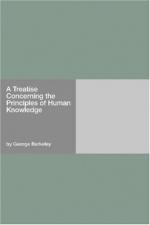89. Of thing or being.—Nothing seems of more importance towards erecting a firm system of sound and real knowledge, which may be proof against the assaults of Scepticism, than to lay the beginning in a distinct explication of what is meant by thing, reality, existence; for in vain shall we dispute concerning the real existence of things, or pretend to any knowledge thereof, so long as we have not fixed the meaning of those words. Thing or Being is the most general name of all; it comprehends under it two kinds entirely distinct and heterogeneous, and which have nothing common but the name. viz. spirits and ideas. The former are active, indivisible substances: the latter are inert, fleeting, dependent beings, which subsist not by themselves, but are supported by, or exist in minds or spiritual substances. We comprehend our own existence by inward feeling or reflexion, and that of other spirits by reason. We may be said to have some knowledge or notion of our own minds, of spirits and active beings, whereof in a strict sense we have not ideas. In like manner, we know and have a notion of relations between things or ideas—which relations are distinct from the ideas or things related, inasmuch as the latter may be perceived by us without our perceiving the former. To me it seems that ideas, spirits, and relations are all in their respective kinds the object of human knowledge and subject of discourse; and that the term idea would be improperly extended to signify everything we know or have any notion of.
90. External things either imprinted by or perceived by some other mind.— Ideas imprinted on the senses are real things, or do really exist; this we do not deny, but we deny they can subsist without the minds which perceive them, or that they are resemblances of any archetypes existing without the mind; since the very being of a sensation or idea consists in being perceived, and an idea can be like nothing but an idea. Again, the things perceived by sense may be termed external, with regard to their origin—in that they are not generated from within by the mind itself, but imprinted by a Spirit distinct from that which perceives them. Sensible objects may likewise be said to be “without the mind” in another sense, namely when they exist in some other mind; thus, when I shut my eyes, the things I saw may still exist, but it must be in another mind.




